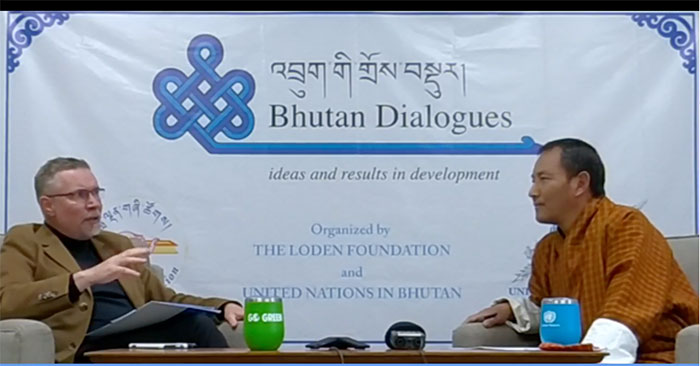Closing educational institutes during outbreaks and lockdowns should be the last resort
Younten Tshedup
With more than 1,000 schools and early childhood care and development (ECCD) centres closed on March 18 last year due to the Covid-19 pandemic, about 180,000 school-going children remained at home.
While schools reopened, many today wonder if the nationwide school closure was the ideal decision.
UNICEF Bhutan representative, Will Parks (PhD) during a recent session of the Bhutan Dialogues, said that, although children across the world might not have been the most vulnerable to Covid-19, the shadow impact of the pandemic was ‘enormous’ on children and their learning.
He said that in March last year, about 182 countries decided to close schools and institutions across the country affecting the learning of almost 2.4 billion (B) individuals starting from pre-school to tertiary level. “We’ve never seen this before.”
Will Parks said that, as a precautionary measure to the pandemic, a similar decision was made by the government in Bhutan. “UNICEF did not recommend closing schools,” he said, adding that a recent study in 191 countries found that the school status — open or close— was not the main driver of Covid-19 pandemic.
He said that there was no scientific correlation between the rate of Covid-19 transmission and schools remaining open or closed.
Will Parks said that, although schools reopened towards the later part of the year, over 300 students did not return. “I’m fearing if we don’t get our messages across, we’ll see a higher number of dropouts as indications are already there. For me, if a child, who needs to be in school, isn’t at school, it’s a lost investment.”
The education sector, he said, was hit the hardest across the world and the impact would be seen several years down the line.
He added that the longer a child remains out of school, the less likely they are to return and stay in school. “Marginalised children, missing out on school, even if only for a couple of weeks can lead to negative outcomes that last a lifetime.”
Will Parks said that, in the event of an outbreak of the disease, and if the country has to undergo another lockdown, schools should be the last institutions to be closed.
“I urge the government to not close the schools again, at least not in a nationwide manner,” he said. “It has to be done based on the risks — wherever there are — in a localised manner. School closure should be the last resort.”
He said that the education and health ministries had conducted ‘sophisticated’ risk mapping months before the pandemic struck the country.
Another participant of the dialogue, Karma Phuntsho (PhD), who is also a spiritual thought leader and a Buddhist teacher, said that, if at all a risk mapping was conducted by the two ministries, they should have handled the situation in a much better manner.
Resident coordinator of United Nations in Bhutan, Gerald Daly, said the pandemic had changed many things and that it had a devastating impact on children.
“This isn’t something a vaccine alone can fix. Covid-19 has taken an enormous toll on children — physical, emotional, mental, and spiritual. It has shut children out of schools that have taught and cared for them.”
He said that a new deal for an entire generation of children will be needed to give children an opportunity to catch up.


